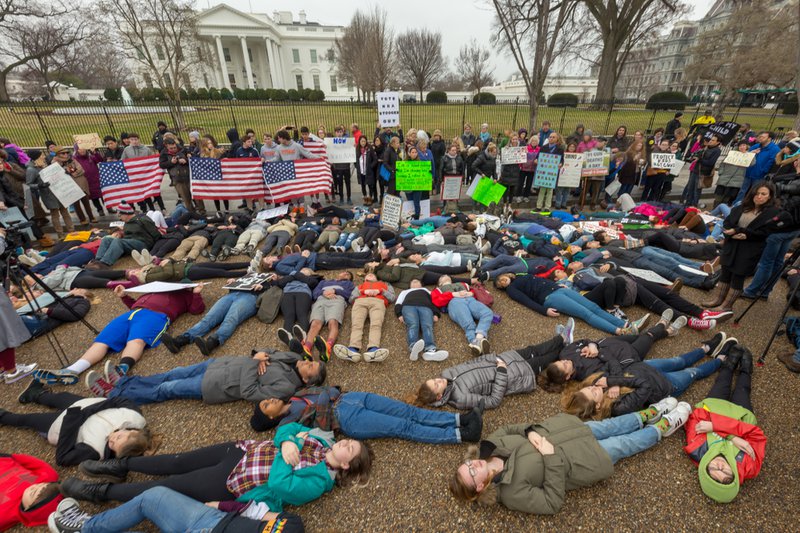Pedagogies of Rage
Weekly Article

Joseph Gruber / Shutterstock.com
March 1, 2018
The activism sparked by the recent school shooting in Parkland, Florida, has been nothing short of awe-inspiring. But while much of the fury of the students-turned-activists has been met with admiration, many pundits criticize that this unwillingness to appeal politely to traditional channels of change will hurt the students’ push for gun control.
But this kind of thinking careens right past a very different reality, which is this: The Parkland students are part of a much broader cohort of activists who have shown that calling BS on respectability can be an effective strategy for securing important concessions.
For one, the activism on display in Parkland provides a counter-narrative to the notion of a “perfect victim.” While they’re primarily white, middle-class suburban kids—a fact that’s certainly played to their advantage—the Parkland students’ anger about the innumerable failures, at all levels of government, that allowed the shooter to legally purchase an assault rifle has meant that they’ve been unafraid, and indeed willing, to challenge opponents of sensible gun control. Even as the students deal with death threats and rumors that they’re “crisis actors,” their persistence has resulted in a nationally televised town hall, the introduction of legislation at the state and federal level, and even sympathetic statements from the president.
The students’ tactics have, in turn, shown that it’s sometimes beneficial to lean into perceptions of disrespect and anti-respectability. For instance, some people disparaged the way in which students spoke to Sen. Marco Rubio (Fla.-R) at the CNN town hall, and yet that moment has led to many notable and material victories, including concessions by the president and advertisers’ being convinced to end their partnerships with the NRA. While these victories are only in the preliminary stages and, in a sense, small, the students’ activism is emblematic of a much longer tradition that undercuts the idea that there’s a “right” way to advocate for social change.
Indeed, this unrepentant activism didn’t start with Parkland. The movement to support undocumented immigrants has also created an important model for how working beyond the formal channels of advocacy can create real victories for activism. While the DREAM Act has struggled to pass Congress, this hasn’t prevented people, and even institutions, across the country from embracing it with compassion. Take how many schools have amended their financial aid policies to more fully accommodate undocumented students, instead of treating them as they would international students (who often receive considerably less aid at both public and private institutions). In addition, many employers have been intentional about offering work authorization in their job postings, which signals that they’re accepting of people who might be on DACA status. These actions have taken place alongside the hundreds of demonstrations and other acts of civil disobedience that have held politicians accountable for deporting people who’ve been living without legal citizenship status for most, if not all, of their lives.
This isn’t to say that activists haven’t stitched more traditional modes of advocacy into their approach: for instance, their push for a “clean” DREAM Act and for legislative fixes on background checks and bans on assault rifles. The deeper point is that the Parkland students and DREAM Act activists have specific goals in mind when it comes to policy, and they’ve resisted allowing outside noise mute their critiques of state violence, apathy, and political incompetence more generally. Here, there’s a through-line to another key movement: Black Lives Matter.
As a recent Teen Vogue article highlights, the work of combating police brutality has always included conversations around gun violence. In consequence, and largely as a result of Black Lives Matter, police agencies in over 24 states have introduced some 40 laws to curb police misconduct. On top of that, protesters convinced the Department of Justice under the Obama administration to investigate civil rights abuses that took place in a number of major police departments. (And of course, this history has an even longer tail: Today’s “antagonistic” activism follows the mid-century tradition of bottom-up protest not beholden to two-party politics.)
On a cultural level, these three movements have forced sustained national dialogue about issues of gun violence, immigration, and police brutality, in a way that likely wouldn’t have been possible had these movements not been propelled by in-your-face tactics. As quick as observers often are to sanitize this brand of activism—to whittle it down to the policy agenda of a few self-appointed leaders—present-day movements for social justice are identifying something that’s long been hiding in plain sight: Rarely has respectability been the most successful means for achieving equality. Purposeful anger, however, has been, and still is, quite effective.